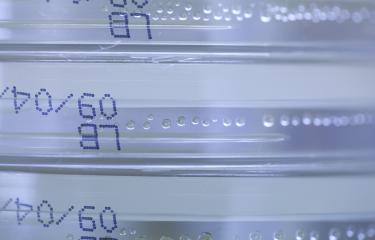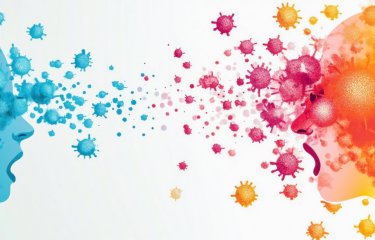Why do we respond differently to infections or vaccines? Why are some people allergic to pollen? These are still unanswered questions in biological and medical science. The Milieu Intérieur Laboratory of Excellence coordinated at the Institut Pasteur by CNRS research director, Dr. Lluis Quintana-Murci, has recently described immune variation on a large scale within the French population. To achieve this, the consortium studied an expansive collection of biological specimens from 1,000 French volunteers aged 20 to 69. This article provides an account of their work.
For many years, immunology, the branch of biology that examines our immune system, focused on dissecting the molecular mechanisms that control our physiological response to infections based on the assumption that this response does not differ among individuals. However, this premise has been challenged by recent studies suggesting that we are not all equally equipped to deal with pathogens. Our age, sex, infection history, and genetics can affect our immune system and make us more prone to disease. The task of identifying these factors that regulate our immune system has become the main challenge facing precision medicine, a proposed medical model aimed at offering patient treatments tailored to individual needs.
Some thirty scientists from several research centers thus joined forces to form the Milieu intérieur Laboratory of Excellence (or LabEx) coordinated at the Institut Pasteur by CNRS research director, Dr. Lluis Quintana-Murci with funding from the Investissements d’Avenir [Investing in the Future] program, with a view to describing immune variation on a large scale within the French population. This consortium gathered an expansive collection of biological specimens from 1,000 healthy donors (500 French men and 500 French women aged 20 to 69) recruited in Rennes. "The subjects' blood, DNA, vaccination and medical history, and intestinal and nasal bacteria were collected, measured, and examined for this large-scale study", explains Lluis Quintana-Murci. The first results from analysis of the entire cohort were recently published in PNAS on December 27, 2017 and in Nature Immunology on February 23, 2018.
Immune variation and differences in terms of sex and age
Using an ex vivo system, the researchers measured changes in immune gene expression in blood samples from the 1,000 donors when exposed to various viruses, bacteria, and fungi. At the same time, "we determined the molecular characteristics of the white blood cells, or leukocytes, in the donors' blood with an unprecedented level of precision", the CNRS researcher and study author Etienne Patin tells us. The two studies confirm that immune variation among individuals is largely due to differences in sex and age. "However, smoking and asymptomatic cytomegalovirus infection, which affects 35% of the population, also have a major impact on our blood cell composition. This may explain why smokers and people infected by this virus can be more prone to infection."
Genetic variations and risk of disease
The researchers' next task was to determine whether our genetics contribute to immune response variation among individuals. Surprisingly, "we identified hundreds of genetic variations which change the expression of molecules that play a key role in immune responses", reports Lluis Quintana-Murci "some of which are associated with a higher risk of developing diseases such as pollen allergy, lupus erythematosus, and type 1 diabetes." These results shed new light on the potential causes of these illnesses, which remain unclear.
The Milieu Intérieur Laboratory of Excellence (or Milieu intérieur LabEx) will now seek to determine whether our intestinal and nasal flora and epigenetics (temporary changes in our DNA) also contribute to immune variation. On a more general level, the extensive biobank developed for the purpose of this consortium will help identify disease risk factors, paving the way to precision medicine for infectious and autoimmune diseases.
Source 1
Distinctive roles of age, sex, and genetics in shaping transcriptional variation of human immune responses to microbial challenges, PNAS, December 27, 2017.
Barbara Piasecka a,b, Darragh Duffy b,c,d, Alejandra Urrutia c,d,e, Hélène Quach a,f,g, Etienne Patin a,f,g, Céline Posseme b, Jacob Bergstedt h,i, Bruno Charbit b, Vincent Rouilly b, Cameron R. MacPherson b, Milena Hasan b, Benoit Albaud j, David Gentien j, Jacques Fellay k,l, Matthew L. Albert b,c,d,e, Lluis Quintana-Murci a,f,g, the Milieu Intérieur Consortium.
a. Unit of Human Evolutionary Genetics, Institut Pasteur, 75015 Paris, France;
b. Center for Translational Research, Institut Pasteur, 75015 Paris, France;
c. Laboratory of Dendritic Cell Immunobiology, Department of Immunology, Institut Pasteur, 75015 Paris, France;
d. INSERM U1223, 75015 Paris, France;
e. Department of Cancer Immunology, Genentech Inc., San Francisco, CA 94080;
f. CNRS Unité de Recherche Associée 3012, 75015 Paris, France;
g. Center of Bioinformatics, Biostatistics and Integrative Biology, Institut Pasteur, 75015 Paris, France;
h. Department of Automatic Control, Lund University, Lund SE-221, Sweden;
i. International Group for Data Analysis, Institut Pasteur, 75015 Paris, France;
j. Translational Research Department, Genomic Platform, Institut Curie, Paris Sciences et Lettres Research University, 75248 Paris, France;
k. School of Life Sciences, École Polytechnique Fédérale de Lausanne, 1015 Lausanne, Switzerland;
l. Swiss Institute of Bioinformatics, 1015 Lausanne, Switzerland
Source 2
Natural variation in innate immune cell parameters is preferentially driven by genetic factors, Nat Immunol, February 23, 2018.
Etienne Patin1-3,26, Milena Hasan4,26, Jacob Bergstedt5,6,26, Vincent Rouilly3,4, Valentina Libri4, Alejandra Urrutia4,7-9, Cécile Alanio4,7,8, Petar Scepanovic10,11, Christian Hammer10,11, Friederike Jönsson12,13, Benoît Beitz4, Hélène Quach1-3, Yoong Wearn Lim9, Julie Hunkapiller14, Magge Zepeda15, Cherie Green16, Barbara Piasecka1-4, Claire Leloup14, Lars Rogge4,17, François Huetz18,19, Isabelle Peguillet20-22, Olivier Lantz20-23, Magnus Fontes6,24, James P. Di Santo4,8,25, Stéphanie Thomas4,7,8, Jacques Fellay9,10, Darragh Duffy4,7,8, Lluís Quintana-Murci1-3,27, Matthew L. Albert4,7-9,27, the Milieu Intérieur Consortium.
1Unit of Human Evolutionary Genetics, Department of Genomes & Genetics, Institut Pasteur, Paris 75015, France
2CNRS URA3012, Paris 75015, France
3Center of Bioinformatics, Biostatistics and Integrative Biology, Institut Pasteur, Paris 75015, France
4Center for Translational Science, Institut Pasteur, Paris 75015, France
5Department of Automatic Control, Lund University, Lund SE-221, Sweden
6International Group for Data Analysis, Institut Pasteur, Paris 75015, France
7Laboratory of Dendritic Cell Immunobiology, Department of Immunology, Institut Pasteur, Paris 75015, France
8INSERM U1223, France
9Department of Cancer Immunology, Genentech, South San Francisco, California 94080, USA
10School of Life Sciences, École Polytechnique Fédérale de Lausanne, Lausanne 1015, Switzerland
11Swiss Institute of Bioinformatics, Lausanne 1015, Switzerland
12Antibodies in Therapy and Pathology, Department of Immunology, Institut Pasteur, Paris 75015, France
13INSERM U1222, France
14Department of Human Genetics, Genentech, South San Francisco, California 94080, USA
15Employee Donation Program, Genentech, South San Francisco, California 94080, USA
16Department of Development Sciences, Genentech, South San Francisco, California 94080, USA
17Immunoregulation Unit, Department of Immunology, Institut Pasteur, Paris 75015, France
18INSERM U783, Faculté de Médecine, Site Necker-Enfants Malades, Université Paris Descartes, Paris 75015, France
19Lymphocyte Population Biology, CNRS URA 1961, Institut Pasteur, Paris 75015, France
20Center of Clinical Investigations CIC-BT1428 IGR/Curie, Paris 75005, France
21Equipe Labellisée de la Ligue de Lutte Contre le Cancer, Institut Curie, Paris 75005, France
22Department of Biopathology, Institut Curie, Paris 75005, France
23INSERM/Institut Curie U932, France
24Centre for Mathematical Sciences, Lund University, Lund SE-221, Sweden
25Innate Immunity Unit, Institut Pasteur, Paris 75015
26These authors contributed equally to this work
27These authors jointly directed this work.




